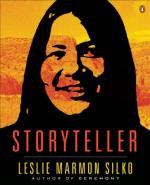|
This section contains 2,770 words (approx. 7 pages at 400 words per page) |

|
N. Scott Momaday has said: "We are what we imagine. Our very existence consists in our imagination of ourselves. . . . The greatest tragedy that can befall us is to go unimagined." It is apparent throughout Storyteller that Silko would agree, and she reminds us that in the oral tradition, "sometimes what we call 'memory' and what we call 'imagination' are not so easily distinguished." In "The Storyteller's Escape," the old storyteller's greatest fear as she waits for death is that she will go unremembered—unimagined. Storyteller itself is a self-renewing act of imagination memory designed to keep storytellers as well as stories from so tragic a fate. The book's opening section, which I will arbitrarily call the "Survival" section, establishes this particular concern. Embracing 5 reminiscences, 4 photographs, 2 traditional Laguna stories, the short stories "Storyteller" and "Lullaby," and the poem "Indian Song: Survival," this section explorers from various angles...
|
This section contains 2,770 words (approx. 7 pages at 400 words per page) |

|




